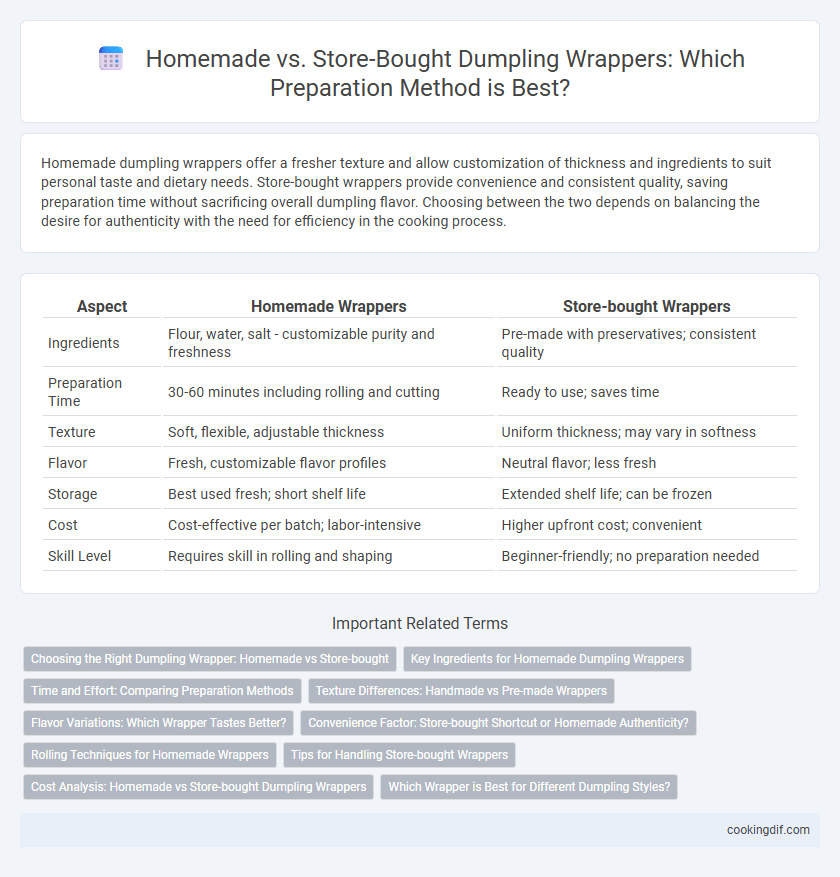Homemade dumpling wrappers offer a fresher texture and allow customization of thickness and ingredients to suit personal taste and dietary needs. Store-bought wrappers provide convenience and consistent quality, saving preparation time without sacrificing overall dumpling flavor. Choosing between the two depends on balancing the desire for authenticity with the need for efficiency in the cooking process.
Table of Comparison
| Aspect | Homemade Wrappers | Store-bought Wrappers |
|---|---|---|
| Ingredients | Flour, water, salt - customizable purity and freshness | Pre-made with preservatives; consistent quality |
| Preparation Time | 30-60 minutes including rolling and cutting | Ready to use; saves time |
| Texture | Soft, flexible, adjustable thickness | Uniform thickness; may vary in softness |
| Flavor | Fresh, customizable flavor profiles | Neutral flavor; less fresh |
| Storage | Best used fresh; short shelf life | Extended shelf life; can be frozen |
| Cost | Cost-effective per batch; labor-intensive | Higher upfront cost; convenient |
| Skill Level | Requires skill in rolling and shaping | Beginner-friendly; no preparation needed |
Choosing the Right Dumpling Wrapper: Homemade vs Store-bought
Choosing the right dumpling wrapper significantly impacts texture and flavor, with homemade wrappers offering a chewier, fresher bite due to control over thickness and ingredients, while store-bought wrappers provide convenience and consistency. Homemade wrappers allow customization using all-purpose or wheat flour to achieve desired elasticity, enhancing traditional recipes, but require skill and time. Store-bought options, available in varieties like round or square and made from wheat or rice flour, suit quick preparation and ensure uniformity, making them ideal for beginners or busy cooks.
Key Ingredients for Homemade Dumpling Wrappers
Homemade dumpling wrappers require key ingredients such as all-purpose flour, water, and sometimes a pinch of salt, allowing control over texture and thickness. Using only flour and water yields a chewy, elastic dough ideal for delicate dumplings, while adding salt enhances flavor and dough strength. Freshly made wrappers provide superior freshness and customization compared to store-bought options, which may contain preservatives or stabilizers affecting taste and pliability.
Time and Effort: Comparing Preparation Methods
Homemade dumpling wrappers require significantly more time and effort, involving dough mixing, kneading, resting, and rolling to achieve the desired thinness and texture. Store-bought wrappers save considerable preparation time, offering consistent thickness and ease of use, ideal for quick meals or beginners. Choosing between the two depends on the balance of desired authenticity and convenience in dumpling preparation.
Texture Differences: Handmade vs Pre-made Wrappers
Homemade dumpling wrappers offer a tender, chewy texture with slight irregularities that enhance the eating experience, providing a fresh, elastic bite. Store-bought wrappers tend to be thinner, more uniform, and slightly starchy, which can result in a firmer texture but greater convenience for quick preparation. The choice between handmade and pre-made wrappers significantly affects the dumpling's mouthfeel and overall authenticity.
Flavor Variations: Which Wrapper Tastes Better?
Homemade dumpling wrappers offer a fresher, more tender texture with a subtle wheat flavor that complements handmade fillings, enhancing the overall taste profile. Store-bought wrappers provide consistent thickness and convenience but often lack the nuanced flavor and elasticity found in freshly rolled dough. Flavor variations depend on homemade wrappers' ability to absorb fillings' juices, creating a richer, more integrated taste experience compared to the neutral flavor of pre-made options.
Convenience Factor: Store-bought Shortcut or Homemade Authenticity?
Store-bought dumpling wrappers offer a significant convenience factor by saving preparation time and ensuring uniform thickness for consistent cooking results. Homemade wrappers provide authentic texture and flavor, allowing customization of ingredients and thickness to suit traditional recipes. Choosing between the two depends on balancing the need for quick assembly against the desire for an artisanal, homemade taste experience.
Rolling Techniques for Homemade Wrappers
Rolling homemade dumpling wrappers requires a well-floured surface and consistent pressure to achieve thin, even circles ideal for steaming or frying. The dough should rest before rolling to ensure elasticity, allowing smooth, uniform rounds typically 3 to 4 inches in diameter. Mastering the wrist-rolling technique helps create delicate wrappers that hold fillings securely without tearing.
Tips for Handling Store-bought Wrappers
Store-bought dumpling wrappers require careful handling to prevent drying out or tearing; keep them covered with a damp cloth while working to maintain moisture and flexibility. Gently separate wrappers using a light dusting of flour or cornstarch to avoid sticking without compromising wrapper texture. When folding, avoid overstuffing and use water to seal edges securely for perfect dumplings that cook evenly.
Cost Analysis: Homemade vs Store-bought Dumpling Wrappers
Homemade dumpling wrappers typically cost less per batch, as basic ingredients like flour and water are inexpensive and readily available in bulk. Store-bought wrappers offer convenience and consistency, but their higher price per pack can add up significantly with frequent use. For budget-conscious cooks making large quantities, preparing wrappers from scratch provides better cost efficiency despite the additional time investment.
Which Wrapper is Best for Different Dumpling Styles?
Homemade dumpling wrappers offer superior texture and customization, making them ideal for delicate styles like Chinese jiaozi or Japanese gyoza, where thinness and pliability enhance the eating experience. Store-bought wrappers provide convenience and consistent size, suitable for quick preparation of thicker-skinned dumplings such as Korean mandu or soup dumplings that require sturdier dough to hold fillings and broth. Selecting the best wrapper depends on the dumpling style's cooking method and desired texture, with homemade preferred for artisanal quality and store-bought favoring ease and uniformity.
Homemade Wrappers vs Store-bought Wrappers for preparation method Infographic

 cookingdif.com
cookingdif.com